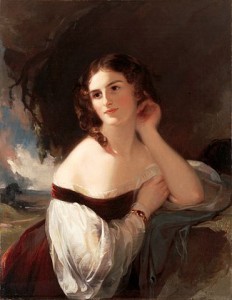 I knew that Fanny Kemble was a 19th-century British actress, but that’s about all I knew about her prior to encountering her description of an 1830 train ride and thoughts about the contrasting attributes and social values of George Stephenson the engineer and Lord Alvanley the aristocrat. Fanny seemed like an astute observer and a good thinker, and one of the first things I did after getting my Kindle was to download her very extensive memoirs. She was born in 1809 to a noted theatrical family, achieved fame as an actress in both Britain and America, wrote two plays and a novel, married an American plantation owner and lived in coastal Georgia, and throughout her life recorded her thoughts and observations in her journal and in letters to friends. Publication of her impressions of America (in 1835) created quite a stir, as did the 1863 publication of her plantation journal, with its searing observations about the realities of slavery.
I knew that Fanny Kemble was a 19th-century British actress, but that’s about all I knew about her prior to encountering her description of an 1830 train ride and thoughts about the contrasting attributes and social values of George Stephenson the engineer and Lord Alvanley the aristocrat. Fanny seemed like an astute observer and a good thinker, and one of the first things I did after getting my Kindle was to download her very extensive memoirs. She was born in 1809 to a noted theatrical family, achieved fame as an actress in both Britain and America, wrote two plays and a novel, married an American plantation owner and lived in coastal Georgia, and throughout her life recorded her thoughts and observations in her journal and in letters to friends. Publication of her impressions of America (in 1835) created quite a stir, as did the 1863 publication of her plantation journal, with its searing observations about the realities of slavery.
Fanny’s writing is a valuable source for anyone interested in the social history of Britain and America during her era; she also has many thoughts about the theater and especially about the plays of Shakespeare; her writing is vivid, intelligent, and often quirky. She can quickly segue from an aesthetic observation of a railway journey to thoughts about governance and religion:
The road from Birmingham here is quite pretty; the country in a most exquisite state of leaf and blossom; the crops look extremely well along this route; and the little cottage gardens, which delight my heart with their tidy cheerfulness, are so many nosegays of laburnum, honeysuckle, and lilac.
The stokers on all the engines that I saw or met this morning had adorned their huge iron dragons with great bunches of hawthorn and laburnum, which hung their poor blossoms close to the hissing hot breath of the boilers, and looked wretched enough. But this dressing up the engines, as formerly the stage-coach horses used to be decked with bunches of flowers at their ears on Mayday, was touching.
I suppose the railroad men get fond of their particular engine, though they can’t pat and stroke it, as sailors do of their ship. Speculate upon that form of human love. I take it there is nothing which, being the object of a man’s occupation, may not be made also that of his affection, pride, and solicitude, too. Were we—people in general, I mean—Christians, forms of government would be matters of quite secondary importance; in fact, of mere expediency. A republic, such as the American, being the slightest possible form of government, seems to me the best adapted to an enlightened, civilized Christian community, a community who deserve that name; and, you know, the theory of making people what they should be is to treat them better than they deserve—an axiom that holds good in all moral questions, of which political government should be one.
Fanny’s father Charles, himself a noted Shakespearean actor, unfortunately took an investment and management interest in the Covent Garden Theater–which position carried personal liability for the theater’s debts and kept the family in scary financial straits for many years. It was largely in the hope of creating a new star who would bring in ticket revenues and head off financial disaster that Fanny was first put on stage, in the role of Juliet, in 1829. She quickly achieved great popular acclaim, but the bottomless quicksand of Covent Garden’s finances led Charles to organize a theatrical tour in the United States for himself and his daughter.
The decision to publish Fanny’s journal describing her impressions of America was driven by the need to generate money for the care of a beloved aunt who had suffered a serious carriage accident. The publishing project was vehemently opposed by Fanny’s new American husband, Pierce Butler, whom she married in 1834, and the conflict set the tone for what was to be a disastrous marriage.
The “Journal of a Residence in America” got a lot of attention, much of it negative. Edgar Allan Poe objected to Fanny’s “dictatorial manner” and felt that the self-confident tone of the book was contrary to “American notions of the retiring delicacy of the female character”…yet he went on to speak of the “sound sense and unwelcome truth” of much of her comment and the book’s “vivacity of style” and “beautiful descriptions.” On the other side of the Atlantic, soon-to-be Queen Victoria told her diary that the book was “very pertly and oddly written…not well bred”…”full of trash and nonsense which could only do harm”….yet a few days later she was admitting that there were “some very fine feelings in it.”